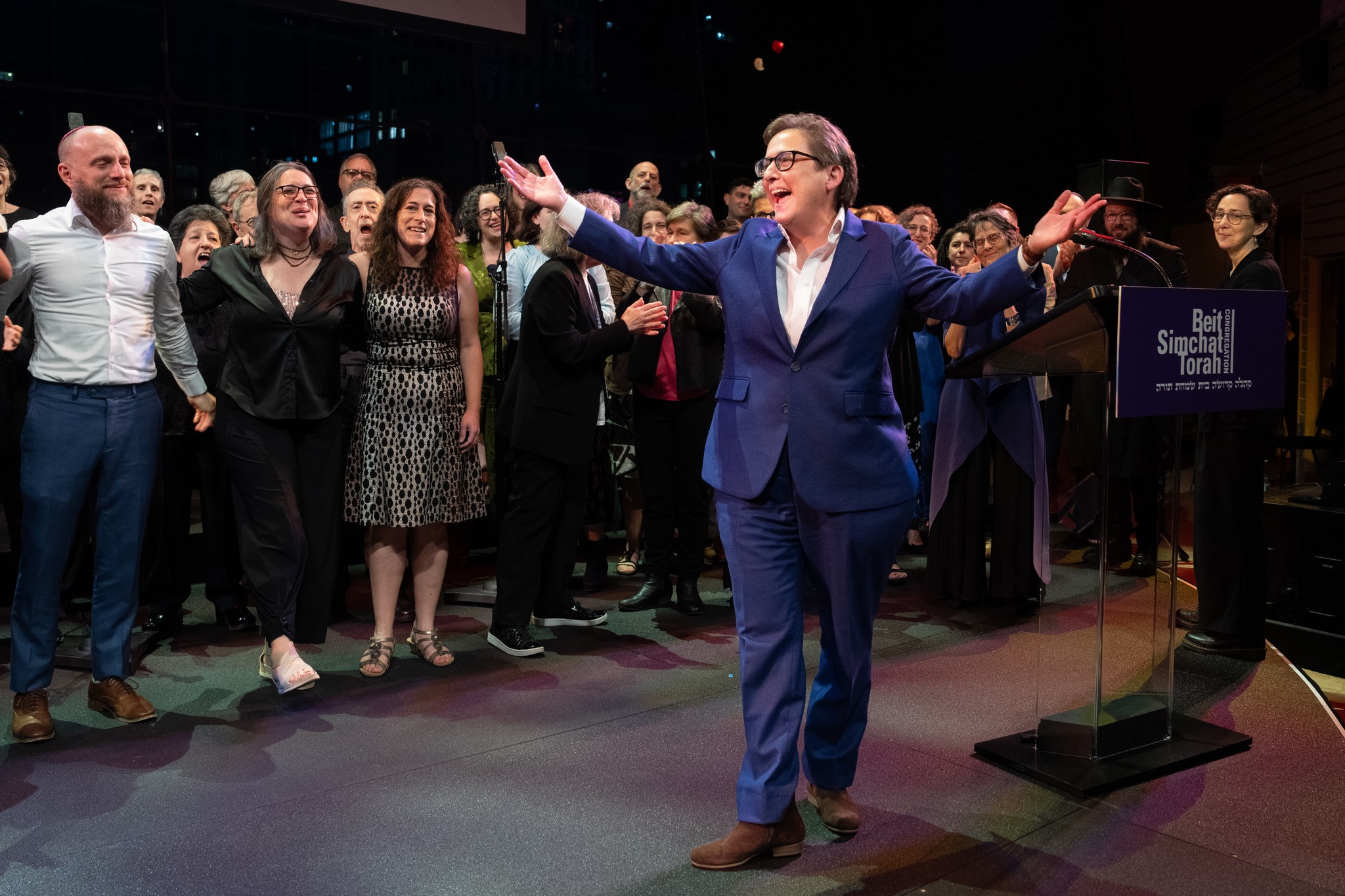After 32 years as a progressive voice for LGBTQ+ Jews, Rabbi Sharon Kleinbaum retires

Rabbi Sharon Kleinbaum. (Photo via Beit Simchat Torah Congregation Facebook page)
NEW YORK (AP) | For more than three decades, Rabbi Sharon Kleinbaum has led the nation’s largest LGBTQ+ synagogue through the myriad ups and downs of the modern gay rights movement – through the AIDS crisis, the murder of Matthew Shepard, historic civil rights advances that included marriage equality, and, most recently, the backlash against transgender rights.
She is now retiring from that role. The New York synagogue she led for 32 years – Congregation Beit Simchat Torah in Midtown Manhattan – must come to terms with its identity after being shaped for so long by its prominent rabbi.
Her resignation also comes at a difficult time for the LGBTQ+ rights movement. Same-sex marriage is legal nationwide, but conservative politicians are imposing restrictions on transgender health care, limiting LGBTQ+ curriculums in schools and proposing to ban drag queen performances.
“I’m blessed and privileged to have the opportunity to use my gifts on behalf of God’s vision for the world,” Kleinbaum said in an interview. “I’m very, very happy that I’ve been able to do that. I just feel like now is the time to make room for a younger generation.”
Kleinbaum, 65, was supported by her community and left-wing politicians and taught an uncompromising progressive vision of Judaism that resonated far beyond the Manhattan enclave and liberal Judaism. When Donald Trump was elected president, Kleinbaum had the synagogue reach out to Muslims. The congregation also built an immigration clinic to help LGBTQ+ refugees in hostile parts of the world gain asylum in the United States.
“It is a religious calling to help immigrants. I see it as just as important to (the synagogue) as leading the Friday night service,” Kleinbaum said.
Congregation Beit Simach Torah, better known as CBST, has about 1,000 paying members. About 4,000 Jews, from the unaffiliated to the Orthodox, attend the temple’s High Holiday services, which are traditionally held at the Jacob Javits Convention Center on New York’s West Side of Manhattan.
Regular congregants at the temple include a who’s who of media and historical LGBTQ+ figures. Edie Windsor, who sued and won the Defense of Marriage Act, was a regular attendee when she was alive. Andy Cohen, of “Real Housewives” fame, is a regular. Joan Rivers showed up for Yom Kippur. Kleinbaum’s wife is Randi Weingarten, the president of the largest teachers union in the country.
After her appointment in 1992, Kleinbaum spent much of her first year burying members of her congregation, many of whom were dying of AIDS. The need for a paid rabbi to provide pastoral care was one of the main reasons the CBST hired its first rabbi. One of her first funerals was for a member of the search committee that hired her.
The 1990s saw the rise of gays and lesbians in public, but also the passage of the federal Defense of Marriage Act, which defined marriage as an exclusive union between a man and a woman.
“She actually did rabbinic triage work in the beginning, working with a community where ultimately a third of its members died of AIDS,” said William Hibsher, who was a member of the CBST for several decades and was there when Kleinbaum was appointed.
Hibsher was not an observant Jew in the early 1990s, but he said he was inspired by Kleinbaum’s work and the care she provided to his partner, who died of AIDS in the mid-1990s. He later became heavily involved with the synagogue, including serving on its board and helping to raise millions for its current location on West 30th Street.
When New York legalized same-sex marriage in 2013, Kleinbaum stood in the park across from the registry office and performed outdoor same-sex weddings. Among the couples she married in 2014 were two men who had spent 20 months planning their wedding, which took place in a former Broadway theater.
Kleinbaum has not yet specified what she plans to do in retirement, but said she will likely continue to work on social justice issues or be active in Democratic politics. The CBST has given her the title of “Senior Rabbi Emerita” to show a level of commitment upon her retirement, but she will no longer own the CBST bimah.
Even people who are considered her ideological opponents have found common ground and work with her on issues of religious freedom and human rights.
When President Joe Biden appointed Kleinbaum to the U.S. Commission on International Religious Freedom, which monitors and researches religious freedom around the world, she served as a commissioner alongside Tony Perkins, the head of the Family Research Council, which opposes the LGBTQ+ rights movement.
“She’s able to step back and see where (two with strong ideological differences) can agree on core issues and see where we can find common ground here,” said Fred Davie, an administrator at Union Theological Seminary and longtime friend of Kleinbaum.
Kleinbaum served two terms on the USCIRF. Her first term ended in early 2020 when she decided to focus attention on her community amid the COVID-19 pandemic. For her and the community, this was familiar territory following the AIDS crisis.
“We knew immediately what elements we were dealing with: isolation, loneliness, fear,” Kleinbaum said. “Of course there were differences between AIDS, but many things were similar enough that it almost felt like muscle memory.”
There is evidently some uncertainty in the community about what will become of the synagogue without them. Like many communities, the CBST tends to have older members; many have been with Kleinbaum from the beginning.
The synagogue appointed Jason Klein as its new chief rabbi earlier this year; he will take office on July 1. But members seem to agree that Kleinbaum is simply irreplaceable.
“I think people, deep down in their hearts, wanted to find a Kleinbaum 2.0 to replace it,” Hibsher said. “There’s a landscape of wonderful progressive synagogues all over Manhattan. So one of the questions the community will be asking is: Is there a need for an LGBT synagogue in 2024? I think there is.”
While Kleinbaum outlined her plans to leave the CBST a year ago, there was an audible gasp among attendees at Yom Kippur services last September when it was mentioned that she would no longer lead the CBST. Her second-to-last Shabbat service on June 21 was sold out. Keynote speaker: New York Attorney General Letitia James.
“Most importantly, she gave us a space,” James said, gesturing toward the synagogue and the standing-room-filled crowd. “This space. Where we are safe. Where we can be free.”



